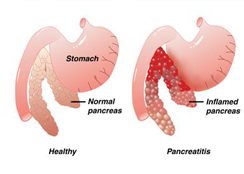
Pancreatitis is the inflammation of the pancreas and is a painful disorder very commonly seen in dogs of any age, breed or sex.
The pancreas is a vital organ that produces hormones like insulin and enzymes that assist in the digestion of food. Pancreatitis is the case where these digestive enzymes are activated while they are still in the pancreas instead of in the small intestines. This results in the body quite literally eating itself as the pancreas will start to be digested.
There are two main forms of this disorder: mild (oedematous) and severe (haemorrhagic) pancreatitis. The mild form of pancreatitis will yield the best results during treatment, whereas haemorrhagic pancreatitis is more difficult to treat.
CAUSES
While the causes of pancreatitis are unknown there are some elements that can contribute to a sudden onset of this disorder. Some medications as well as rich, fatty food can be strong factors to the problem, but cases are seen where neither are present.
SIGNS AND SYMPTOMS
• Nausea
• Vomiting
• Fever
• Abdominal pain
• Diarrhoea
• Severe onset pancreatitis can also cause shock, depression and even death.
DIAGNOSIS AND TREATMENT
Diagnosing pancreatitis is based on clinical signs, laboratory testing, x-ray and possible ultrasound results.
Because eating stimulates the pancreas and treatment involves resting the vital organ, no food or water will be given for 2-3 days. IV fluid will prevent dehydration in these cases and generally requires potassium supplementation because potassium depletes in the pancreatitis.
Patients will be given 24 hour care and monitored via blood testing several times a day. Injectable pain medication, fentanyl patches and continuous intravenous drips are used to effectively control pain and stabilize the patient. In most cases an anti-nausea medication is given and also antibiotics to counteract bacterial invasion from the diseased intestine.
It is important to contact Pet Doctors immediately if you suspect your pet has any of the above signs as early diagnosis and treatment ensures the best possible outcome.

